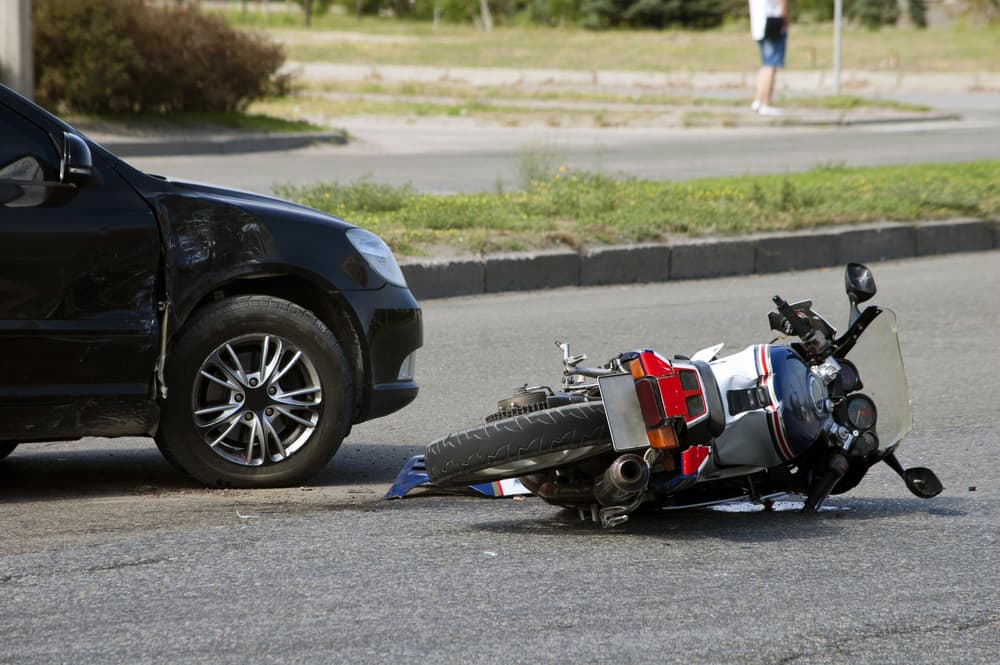Lacking sufficient protection on the road, victims of motorcycle accidents may endure serious injuries that can leave them permanently incapacitated. Whenever a motorcyclist suffers injuries in a collision that results from another driver's negligence, they can file a personal injury claim or lawsuit.
The amount of time it takes to resolve a lawsuit will depend upon various factors, including the jurisdiction and court where the case is pending and the insurance company's willingness to settle without needing a trial or other litigation proceeding.
A knowledgeable Atlanta motorcycle accident lawyer can streamline the process for you and work to recover the damages you need as quickly as possible.
Locations for Motorcycle Accidents
Motorcycle accidents vary frequently across locations due to environmental, infrastructural, and behavioral factors.
Several reasons contribute to the higher occurrence of motorcycle accidents in certain areas, including:

- Traffic Density – Areas with high traffic density, such as urban centers or busy intersections, are more prone to motorcycle accidents. The increased number of vehicles, complex traffic patterns, and diverse road users heighten the risk of motorcycle collisions.
- Infrastructure Quality – Poorly maintained roads, inadequate signage, and uneven road surfaces significantly contribute to motorcycle accidents. In locations with subpar infrastructure, motorcyclists face challenges in navigating the area safely, increasing the likelihood of traffic accidents.
- Weather Conditions – Regions with adverse weather conditions, such as heavy rain or fog, frequently experience a higher incidence of motorcycle accidents. Slippery road surfaces, poor visibility, and decreased traction pose additional rider risks.
- Lack of Motorcycle Awareness – Some locations may exhibit a lack of awareness or understanding among other road users regarding the presence and vulnerabilities of motorcyclists. In areas where drivers are less accustomed to sharing the road with motorcycles, there is an increased risk of accidents due to driver oversight or negligence.
- Economic Development – Economic development can significantly affect the frequency of motorcycle accidents. Rapidly developing areas may witness increased traffic, construction, and changing road conditions, contributing to a higher risk of accidents.
- Tourist Areas – Locations that attract many tourists may experience more motorcycle accidents. Tourists unfamiliar with local traffic patterns and road conditions and the potential rental of motorcycles can contribute to accidents.
Suppose you suffered injuries in a recent motorcycle accident in one of these locations. In that case, an experienced attorney can pursue a personal injury claim with the at-fault party's insurance company, seeking the compensation you deserve.
Schedule a Free Initial Consultation Today!
Injuries that Motorcycle Riders Suffer
When a motorcycle rider falls on the ground in an accident, the consequences can be severe due to the lack of protective barriers afforded by a motorcycle compared with other vehicles. The effect of the fall and subsequent contact with the ground can result in various injuries, ranging from minor to life-threatening.
Some of the most common motorcycle-accident injuries that riders suffer include:

- Contusions and Bruises – Hitting the ground hard can lead to contusions and bruises. These injuries occur when the body absorbs the force of a fall, causing blood vessels to rupture. While generally less severe than other injuries, extensive bruising can still cause significant pain and discomfort.
- Road Rash – One of the most common injuries in a motorcycle accident is road rash. As the rider skids along the pavement, friction may cause abrasions to the exposed skin. Road rash injuries can also vary in severity, from mild scrapes to deep wounds that may require medical attention and skin grafts.
- Fractures and Broken Bones – The force of a motorcycle collision can result in fractures or broken bones. Commonly affected areas include the wrists, arms, legs, and collarbones. Motorcycle riders are particularly vulnerable to fractures, as they lack the protective enclosure of a car.
- Spinal Cord Injuries – A fall from a motorcycle can result in spinal cord injuries, ranging from herniated discs to more severe damage. Spinal injuries can also affect mobility, sensation, and overall quality of life.
- Head Injuries – Head injuries are a significant concern for motorcycle riders who fall off their bikes in accidents. Even with helmets, the impact can lead to concussions, traumatic brain injuries (TBIs), or other head trauma. Proper helmet usage is crucial for minimizing the risk of severe head injuries.
- Internal Injuries – The force of a motorcycle collision can cause internal injuries, including organ damage or internal bleeding.
- Emotional Trauma – Falling in a motorcycle accident can lead to emotional trauma. The fear and stress associated with the incident, combined with the potential severity of injuries, can contribute to post-traumatic stress disorder (PTSD), anxiety, and other mental health challenges.
- Dislocations – Falling from a motorcycle can also lead to joint dislocations, particularly in shoulder or knee areas. Dislocations require prompt medical attention to address and stabilize the affected joints.
Suppose you suffered any of these injuries in a recent motorcycle collision. In that case, an experienced personal injury attorney can pursue the compensation you deserve while you focus on getting the medical attention you need.
When to File a Motorcycle Accident Lawsuit
Filing a motorcycle accident lawsuit and pursuing litigation becomes necessary when seeking compensation for injuries and damages.
Here are some circumstances that may warrant initiating a motorcycle accident lawsuit:
- Severe Injuries and Significant Damages – If the motorcyclist sustains severe injuries resulting in substantial medical expenses, long-term rehabilitation, or permanent disabilities, filing a lawsuit may be necessary. The extent of injuries and associated damages is critical in determining the need for legal action.
- Liability Disputes – When there is a dispute over liability – determining who is at fault for the motorcycle accident – legal action may become necessary. If the responsible party denies fault, challenges the evidence, or disputes the extent of their liability, pursuing a lawsuit can help establish accountability through the legal process.
- Inadequate Insurance Coverage – If the at-fault party has insufficient insurance coverage to compensate for the motorcyclist's injuries and damages, filing a lawsuit may be necessary to seek additional compensation. This is particularly relevant when medical expenses, lost income, and other losses exceed the available insurance limits.
- Uncooperative Insurance Companies – If the at-fault party's insurance company is uncooperative, delays or denies the claim, or offers an inadequate settlement, pursuing a lawsuit may be the only recourse to ensure fair compensation. Insurance disputes may necessitate legal intervention to protect the rights of the injured motorcyclist.
- Wrongful Death – In cases where a motorcycle accident results in the tragic loss of life, surviving family members may need to file a wrongful death lawsuit. This legal action seeks compensation for the emotional and financial losses suffered due to the wrongful death of a loved one.
- Evidence Preservation – Filing a lawsuit may be necessary to preserve crucial evidence, especially if there is a risk of evidence being lost, destroyed, or altered. Legal proceedings can compel the preservation of evidence, ensuring a thorough investigation into the circumstances of the motorcycle accident.
- Non-Cooperation from the At-Fault Party – If the at-fault party refuses to cooperate, provide information, or engage in settlement negotiations, pursuing a lawsuit becomes a means to compel their participation in the legal process and seek appropriate compensation.
Filing a motorcycle accident lawsuit at the right time can protect the injured party's rights and recover just compensation.
An experienced motorcycle accident attorney can guide you on the specific circumstances of your case and determine the most appropriate course of legal action.
Legal Elements in a Motorcycle Accident Case

Motorcycle accident victims seeking a favorable settlement or litigation result must establish several legal elements to prove liability and secure compensation for damages.
These elements can build a strong case:
- Duty of Care – The victim must establish that the at-fault party owed them a duty of care. In the context of a motorcycle accident, this duty typically refers to the obligation of all road users to drive responsibly and follow traffic laws.
- Breach of Duty – You must demonstrate that the at-fault party somehow breached their legal duty of care. This breach may involve reckless driving, distracted driving, failure to yield, speeding, or any behavior that deviates from the expected standard of care on the road.
- Causation – Proving causation is crucial; the victim must show that the at-fault party's breach of duty directly caused the motorcycle accident and subsequent injuries. Establishing a clear connection between the negligent actions and the harm that the accident victim suffered is vital.
- Damages – To pursue compensation, the victim must demonstrate the extent of damages incurred due to the motorcycle accident. Damages may include medical expenses, property damage, lost income, pain and suffering, and other losses directly attributable to the incident.
- Admissible Evidence – Collecting and presenting relevant, admissible evidence is crucial for building a compelling case. This may include accident reports, witness statements, accident scene photographs, medical records, and other documentation supporting the victim's claims.
- Witness Testimony – Eyewitness testimony can provide valuable perspectives on the events leading up to the motorcycle accident. Witness statements can corroborate the victim's events and strengthen the case.
- Professional Testimony – Professional testimony may be necessary in some motorcycle accident cases. For example, certified accident reconstructionists can analyze the scene to provide insights into how the collision occurred, helping the accident victim establish liability (or fault) for the accident.
- Compliance with Traffic Laws – Demonstrating that the motorcycle accident victim fully complies with all traffic laws and regulations strengthens their case. Adherence to traffic laws enhances the victim's credibility and supports the argument that they were not at fault for the collision.
- Timely Legal Action – Initiating legal action within the statute of limitations is also crucial. Failing to file a lawsuit within the specified timeframe may result in losing one's right to pursue a personal injury claim or lawsuit.
Successfully proving these legal elements requires careful documentation, thorough investigation, and the experience of a skilled personal injury attorney. A strategic and comprehensive approach can achieve a favorable settlement or litigation result in a motorcycle accident case.
Factors That May Determine the Length of a Motorcycle Accident Case
The ultimate duration of a motorcycle accident claim or lawsuit often depends upon various factors that shape the legal process – and the time it takes to resolve.
One significant factor is the complexity of the case. If the circumstances surrounding the motorcycle accident are straightforward, the legal proceedings may progress more efficiently, liability is clear, and damages are easily quantifiable.
Conversely, cases with complex liability issues, disputes over causation, or challenges in determining the extent of damages may experience prolonged timelines. Investigations into intricate aspects of the accident, such as accident reconstruction or professional testimony, can contribute to delays.
The severity of injuries sustained in the motorcycle accident is another pivotal factor. Cases involving severe injuries (such as spinal cord damage or paralysis) often require extensive medical treatments, rehabilitation, and assessments of long-term consequences.
Before accurately valuing the claim, allow sufficient time for the injured party to reach maximum medical improvement and gather comprehensive medical records.
Insurance company negotiations also significantly affect the duration of a motorcycle accident claim or lawsuit. If the insurance adjusters are prompt in their assessments, agree on liability and fair compensation, and promptly offer a favorable settlement, we may expedite the resolution.
However, if there are disputes over liability or coverage limits – or if the insurance company is uncooperative – the case will likely take longer.
Legal complexities arising from disputes over liability or issues related to multiple parties involved in the accident can also affect the case timeline. When there is a dispute over liability, your case may need extensive discovery, witness depositions, and professional testimony, contributing to a longer legal process.
The efficiency of communication and cooperation between the parties involved can also influence the length of a motorcycle accident case. Timely responses to requests for information, cooperation in the discovery process, and an openness to settlement negotiations can help expedite the resolution.
The court's docket and schedule also play a role in determining the timeframe for a motorcycle accident lawsuit. Courts may experience varying caseloads and scheduling constraints, affecting trial and hearing dates' availability.
The willingness of both parties to engage in alternative dispute resolution (ADR) methods, such as mediation or arbitration, can also affect the case's duration. These methods often offer a quicker resolution compared to a full-fledged trial.
Ultimately, the unique circumstances of each motorcycle accident case will influence the length of the claim or lawsuit.
Clear communication, diligent case management, and strategic legal approaches are essential for navigating the complexities and efficiently pursuing a fair and just resolution for the injured motorcycle accident victim.
Contact a Motorcycle Accident Lawyer About Your Legal Matter Today
If you recently sustained injuries in a motorcycle crash, you need to involve a knowledgeable personal injury attorney as quickly as possible. Your attorney can promptly file a claim or lawsuit and pursue an efficient and favorable resolution to your case.




























